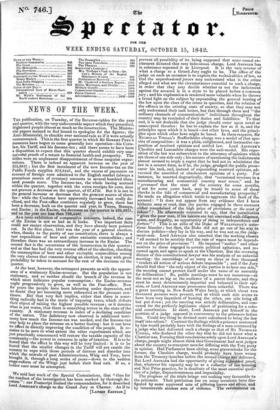NEWS OF THE WEEK.
THE publication, on Tuesday, of the Revenue-tables for the year and quarter, with the very unfavourable aspect which they presented, frightened people almost as much as the insurrection. The Ministe- rial papers seemed to feel bound to apologize for the figures ; the Anti-Ministerial, to chuckle over national ruin as if it were actually consummated. This is the first quarter in which Sir ROBERT PEEL'S measures have begun to come generally into operation—his Corn- law, his Tariff, and his Income-tax ; and there seems to have been a disposition to expect that this quarter should exhibit very une- quivotal proofs of a return to financial health and prosperity. The tables were an unpleasant disappointment of those sanguine expec- tations. There is indeed an apparent increase on the year Of 355,981/. ; but the first instalment of the new Income-tax on the Public Funds supplies 313,844/., and the excess of payments on account of foreign corn admitted to the English market (always a precarious source of revenue) amounts to several hundred thou- sand pounds more. The Income-tax, the whole having accrued within theluarter, together with the extra receipts for corn, does not prevent a decrease on the quarter, of 67,472/. But it is not in the general increase or decrease that the greatest source of alarm lies : while the Customs have apparently increased but really de- clined, and the Post-office continues regularly to grow, there has been a decrease, both on the quarter and year, in Taxes, Stamps, and Excise : in the Excise, the decrease on the quarter is 434,831/., and on the year not less than 733,448/.
As a mere exhibition of comparative accounts, indeed, the case of the Excise is not so bad as it looks. Two important facts could not escape observation, and they have already been pointed out. In the first place, 1841 was the year of a general election, when, thanks to the purity of our constitution, there is always a vast expenditure of beer and other excisable commodities ; and therefore there was an extraordinary increase iii the Excise. The second fact is the occurrence of the insurrection in this quarter; and as that has had the very reverse effect of the election, checking the consumption of beer and other excisable commodities among the very classes that consume during an election, it may with great probability be taken to account for the rest of the decrease on the quarter.
At the best, however, the retrospect presents us with the appear- ance of a stationary Excise-revenue. But the population is not stationary, and so neither should the branch of the revenue be which most indicates popular consumption : the Excise-revenue ought progressively to grow, as well as the Post-office. Now for years the people have been labouring under depression, and no doubt they are becoming more exhausted as the pressure con- tinues. But that very fact implies, either that there is some- thing radically bad in the mode of imposing taxes, which defeats their object of raising the highest possible revenue ; or it denotes what is yet worse, that there is something rotten in the state of the country. A stationary revenue is index of a declining condition of the nation. The deficiency now observed is additional testi- mony how much the Income-tax was needed, and the Income-tax may help to place the revenue on a better footing : but it can have no effect in directly improving the condition of the people. It re- mains to be seen to what extent the other experiments which are Just practically, commenced will restore -the taxable capacity of the community—the power to consume in spite of taxation. It is to be feared that the effect in this way will be very limited : it is to be feared that the smaller changes in the Tariff will not enable the country to cope with those periods of distress and disorder into which the misrule of past Administrations, Whig and Tory, have brought it, through a long series of years—down to the sudden stage-reform of the Whigs just before their final exit. If so, a bolder cure must be attempted.


























